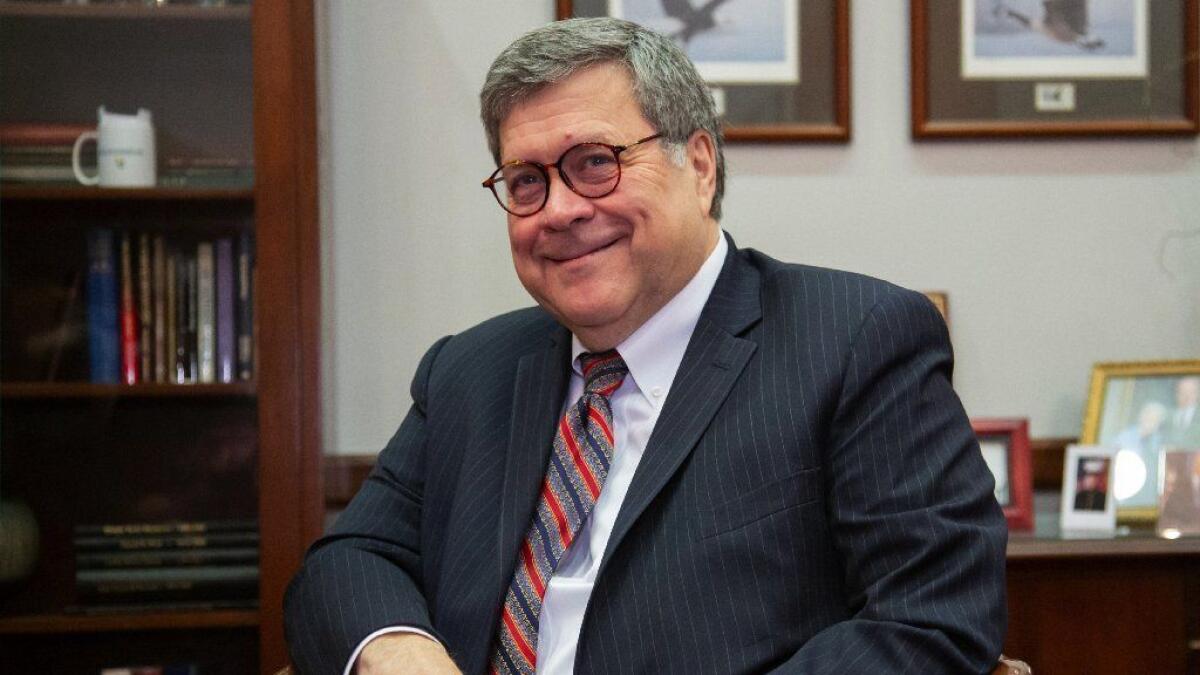Bill Barr is pandering on COVID-19 church services. But he’s probably right on the law

- Share via
Anything the Trump administration says or does on religious liberty arouses skepticism because this president has relentlessly pandered to his evangelical Christian base. As part of that campaign, he has exaggerated the legal significance of what are largely symbolic actions. That was true of an executive order that, in Trump’s telling, did away with a provision in the tax codes that prohibits churches from endorsing political candidates. Except it didn’t.
So it’s understandable that eyebrows are raised by Atty. Gen. William Barr’s intervention on behalf of a Mississippi church that was ticketed for holding drive-in services in which worshipers listened to sermons on the radio in a church parking lot despite the COVID-19 pandemic. (The church uses a radio frequency that is audible only within a block from the building.)
The Justice Department announced this week that it was filing a “statement of interest” in a lawsuit brought by the Temple Baptist Church against the City of Greenville. In its statement the department said: “The facts alleged in the complaint strongly suggest that the city’s actions target religious conduct” in violation of the 1st Amendment’s protection of the free exercise of religion.
Barr personally got involved by issuing a statement that, while acknowledging the importance of social distancing during the pandemic, said that the city apparently had “singled churches out as the only essential service (as designated by the state of Mississippi) that may not operate despite following all [Centers for Disease Control and Prevention] and state recommendations regarding social distancing.”
Barr went on to add a rhetorical — and political — flourish to his analysis of the law.
“Religion and religious worship continue to be central to the lives of millions of Americans. This is true more so than ever during this difficult time. The pandemic has changed the ways Americans live their lives. Religious communities have rallied to the critical need to protect the community from the spread of this disease by making services available online and in ways that otherwise comply with social distancing guidelines.”
As a matter of judgment, the Temple Baptist Church probably made an error in scheduling the drive-in services. Yes, the faithful listened to the word of God in their cars with the windows rolled up. But, as Greenville Mayor Erick Simmons noted, there could be other problems with drive-in services.
“You’re there for a 2-hour-period of time, folks want to use the bathroom, or go potty, and the little girls want to go use it,” Simmons said. “Now folks are in and out and they are facing this invisible giant called COVID-19.”
It’s also notable that other religious organizations, including the Vatican, have taken a seemingly more cautious position about gathering the faithful together during a pandemic.
But whether or not the drive-in services were a good idea, Barr is right that treating religious organizations differently from movie theaters, restaurants and concert halls is problematic. As he put it: “Religious institutions must not be singled out for special burdens.”
The credibility problem arises not from the assertion of this principle but by the administration’s history of pandering to religious believers. The administration, you might say, is reaping what it sowed.
More to Read
A cure for the common opinion
Get thought-provoking perspectives with our weekly newsletter.
You may occasionally receive promotional content from the Los Angeles Times.










